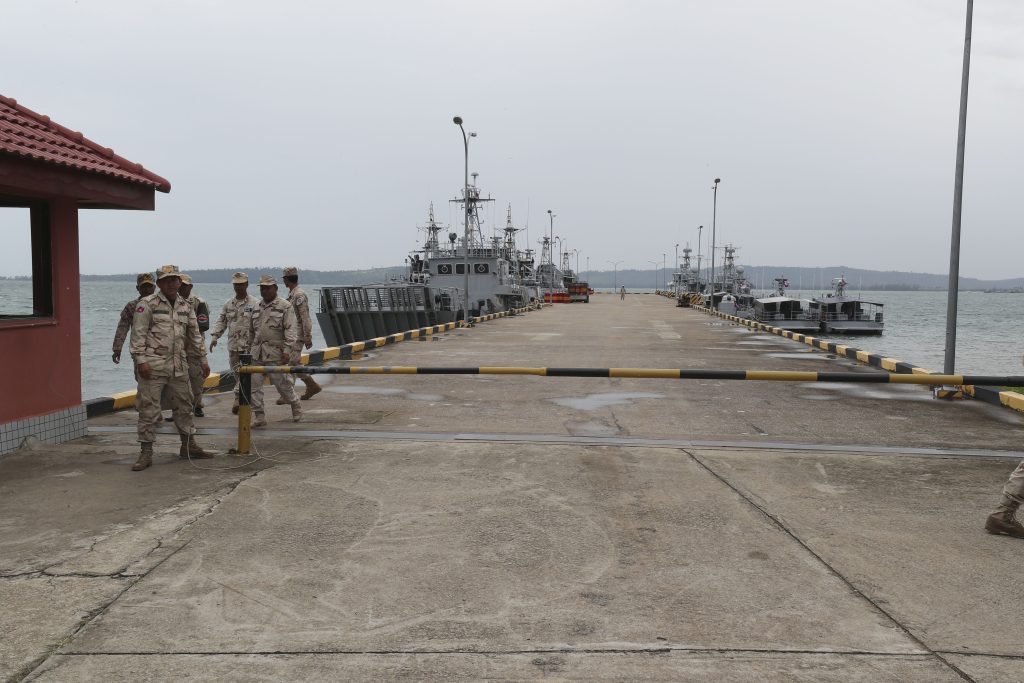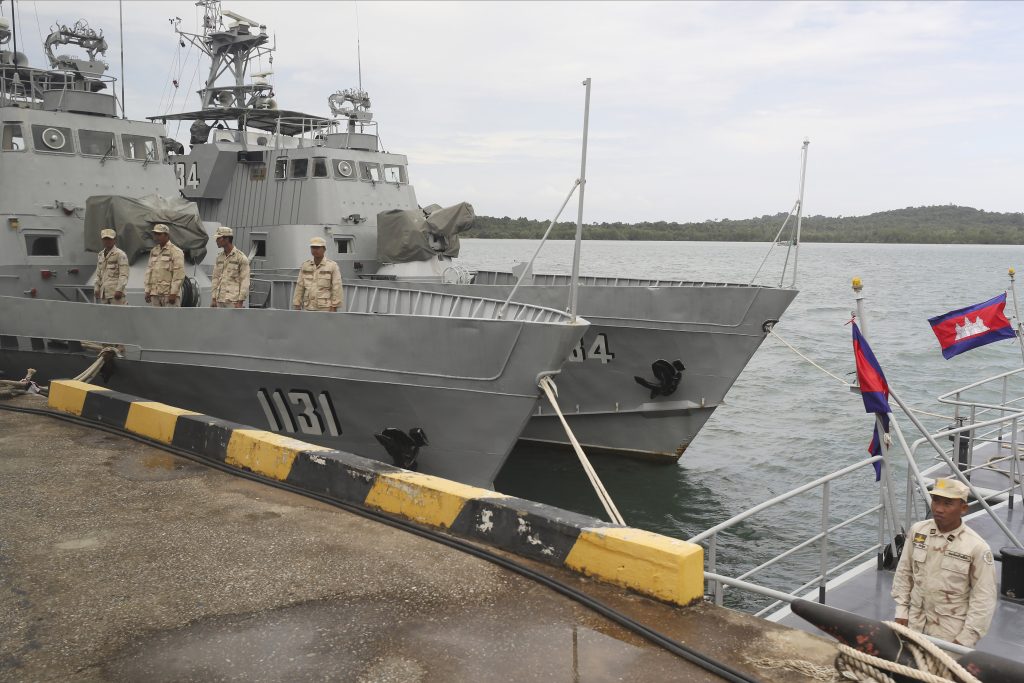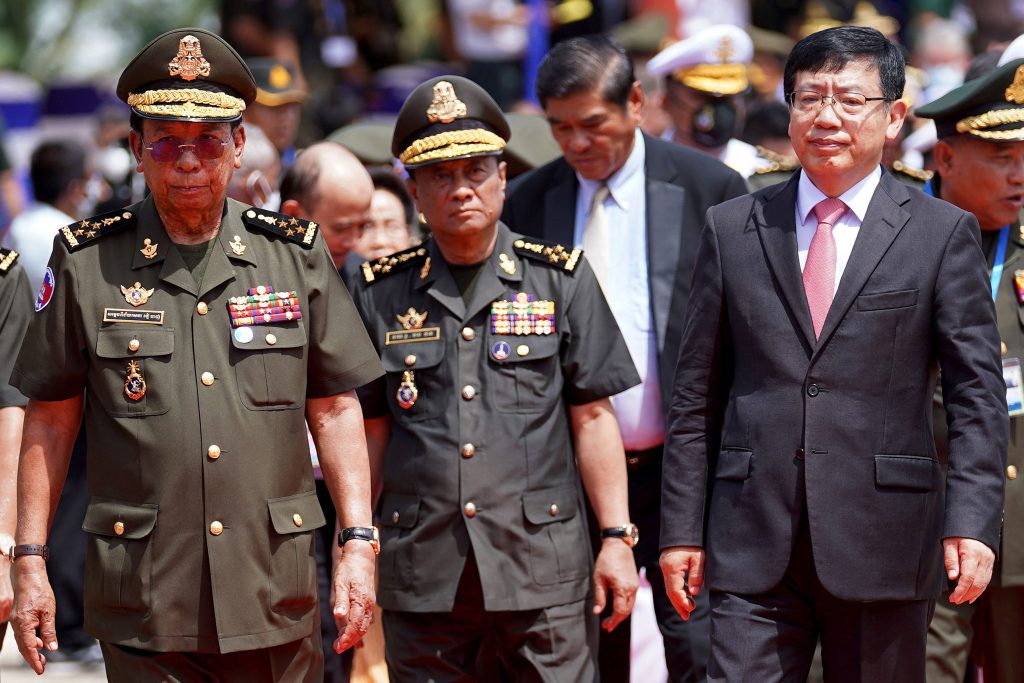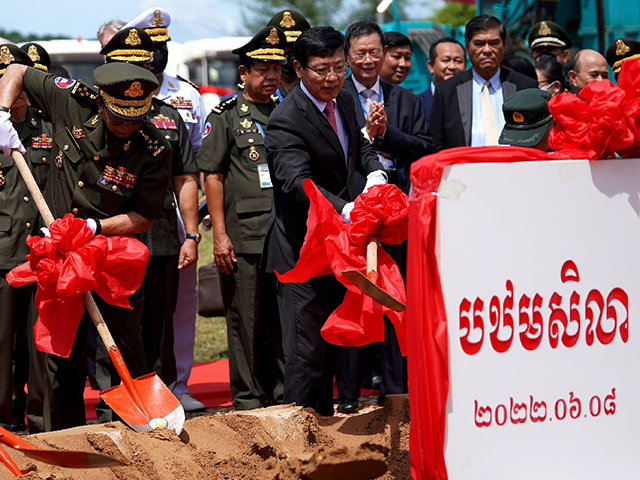China on Wednesday hailed its “iron-clad partnership” with Cambodia and broke ground on a joint project to expand the Ream Naval Base.
The U.S. Embassy in Cambodia responded with a statement that allowing a Chinese military presence at Ream “could threaten Cambodia’s autonomy and undermine regional security.”
Ream is located along the coast of the Gulf of Thailand, which is connected to the South China Sea. China claims almost the entirety of the South China Sea and spent the past decade militarizing islands across the region to enforce its claims against rival powers like Japan, Vietnam, and the Philippines.
Establishing a naval base in Cambodia would allow the Chinese to dispatch warships and surveillance craft to the farther reaches of the South China Sea more quickly, with less time for other nations to monitor their movements. This is a matter of particular concern for Cambodia’s neighbor Vietnam, which has become alienated from the regime in Beijing.
The United States has long expressed “serious concerns” about the Chinese presence at Ream. Satellite photos taken in January revealed dredgers deepening the water around the port, an improvement that would make it much more useful to Chinese warships.
The U.S. sanctioned two Cambodian officials in November for allegedly conspiring to inflate the cost of expanding the base and personally profiting from the construction project. China criticized the sanctions as interference in Cambodia’s “internal affairs.”

Cambodian navy troop members walk on the pier at Ream Naval Base in Sihanoukville, southwestern of Phnom Penh, Cambodia on July 26, 2019. (AP Photo/Heng Sinith)
“The equal and mutually beneficial cooperation between China and Cambodia does not allow interference by foreign forces,” the Chinese Foreign Ministry said in November.
Chinese and Cambodian officials are still dismissing U.S. concerns about the security threat posed by expanding Ream with Chinese assistance.
“The U.S. and countries in the region have expressed concern about the lack of transparency on the intent, nature, and scope of this project as well as the role the PRC military is playing in its construction and in post-construction use of the facility,” the U.S. Embassy reiterated Wednesday.
Australian Prime Minister Anthony Albanese called the Ream project “concerning” on Tuesday.
“We’re in regular contact with the Cambodian government and we have been consistently assured that no foreign military will be granted exclusive access at Ream,” he said.

Cambodian navy crew stand on a patrol boat at the Ream Naval Base in Sihanoukville, southwest of Phnom Penh, Cambodia, July 26, 2019. (AP Photo/Heng Sinith)
“We’ve been aware of Beijing’s activity at Ream for some time,” Albanese said. “We encourage Beijing to be transparent about its intent and to ensure that its activities support regional security and stability.”
Cambodian Defense Minister Tea Banh, who attended the ground-breaking ceremony for the “modernization” project on Wednesday, claimed the upgraded port would still be limited to ships of 5,000 tons displacement or less, which includes only small military vessels.
“Please don’t be too worried about this Ream base. This port is too small and even after upgrading it can’t be a port that would threaten any countries,” he said.
“The Kingdom of Cambodia will not allow a foreign military base on its own territory,” he promised.

Cambodia’s Defense Minister Tea Banh (L) and China’s Ambassador to Cambodia Wang Wentian (R) take part in a groundbreaking ceremony at the Ream naval base in Preah Sihanouk province on June 8, 2022. (PANN BONY/AFP via Getty Images)
The defense minister invited foreign representatives to tour the base in its current state so they could see “there is nothing here” – but then admitted it would become a “restricted military zone” with zero access for foreign observers after the upgrade is completed in about two years.
Chinese ambassador Wang Wentian used the ground-breaking ceremony to salute the “iron-clad partnership” between China and Cambodia – a relationship made deeper by Western concerns that Cambodian Prime Minister Hun Sen has been persecuting his political opponents to remain in power since 1985. Hun Sen is currently grooming his 44-year-old son Hun Manet to take over, possibly as soon as 2023.
China famously does not care what the leaders of its client states do to perpetuate their regimes. Wang’s remarks oozed with smug confidence that demands for more transparency from the Cambodians about Ream will fall on deaf ears.
“China and Cambodia have become ironclad brothers, economical with words but generous in action, treating each other with all sincerity and standing side by side at challenging times,” he boasted.
“Some countries keep smearing legitimate exchanges and cooperation between China and Cambodia and arbitrarily impose unilateral sanctions on Cambodia under the false subterfuge of ‘democracy’ and ‘human rights,’ blatantly interfering in Cambodia’s internal affairs through ‘long-arm jurisdiction. We firmly oppose all these misbehaviors,” Wang said, making a thinly veiled reference to the U.S. sanctions against Cambodian officials from November.
The Washington Post on Monday quoted Western officials who said that contrary to denials from Cambodia and China, the Chinese People’s Liberation Army (PLA) is indeed building a secret military facility at Ream. Previous reports indicated Cambodia signed a secret agreement with the PLA to give it access to the naval base.
An unnamed Chinese official in Beijing was remarkably willing to admit that a “portion” of Ream will be given to the PLA. This official said Chinese scientists would also use these facilities, which would be segregated from the Cambodian parts of the base.
The Cambodian embassy in Washington, D.C. dismissed the Washington Post report as “a baseless accusation motivated to negatively frame Cambodia’s image,” and insisted the expansion of Ream “serves solely to strengthen the Cambodian naval capacities.”
“There is no agreement or law saying that the construction is reserved for Chinese benefit exclusively,” Cambodian government spokesman Phay Siphan insisted to Radio Free Asia (RFA) on Tuesday.
RFA pointed out that Cambodian officials have made some comically obvious efforts to conceal China’s activities at Ream, including the very abrupt termination of its much-ballyhooed foreign observation tours when the foreign observers ask to see inside certain buildings.

COMMENTS
Please let us know if you're having issues with commenting.